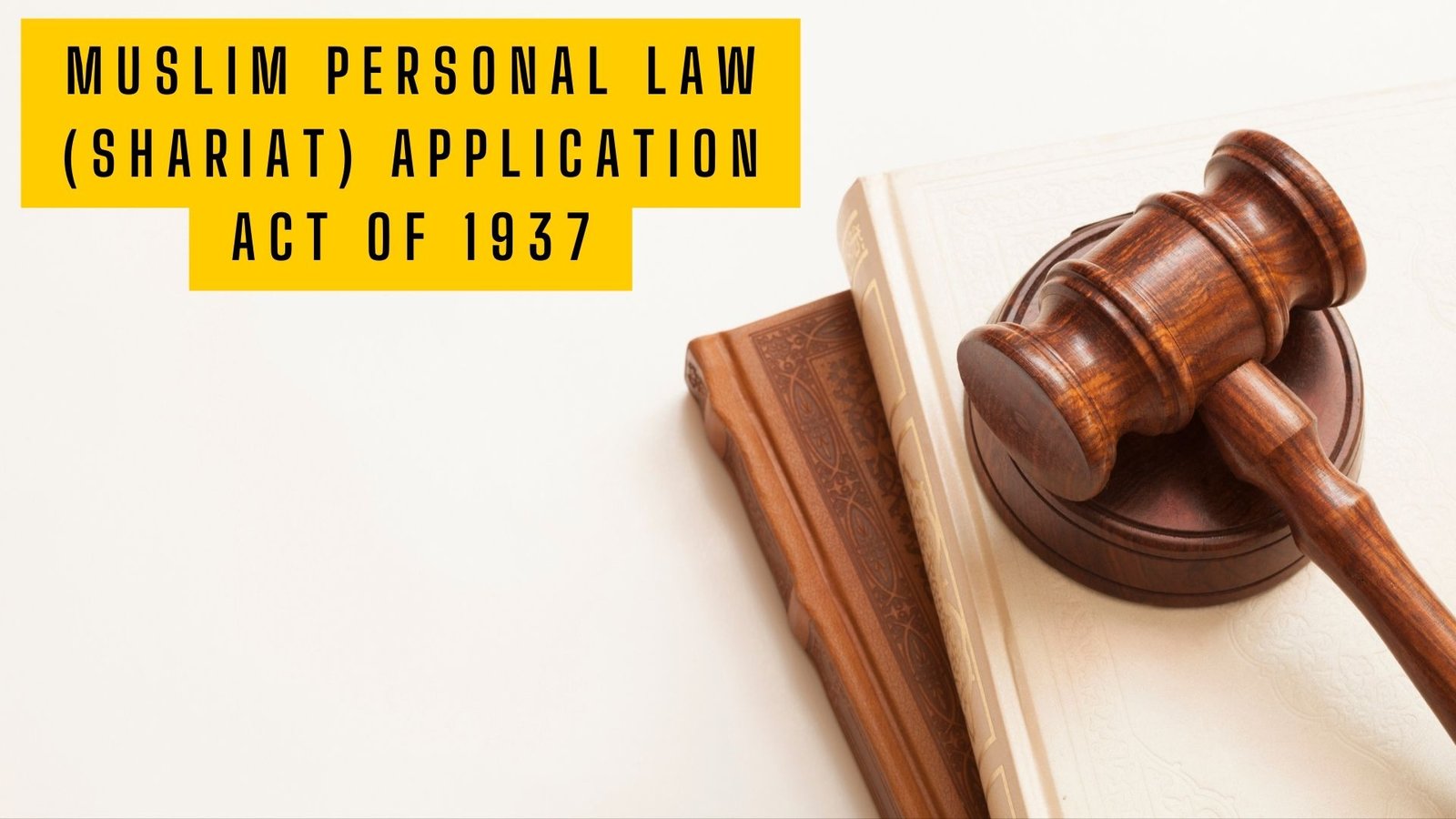On this page you will read detailed information about Muslim Personal Law (Shariat) Application Act, 1937.
Considering the far-reaching implications of the Muslim Personal Law (Shariat) Application Act of 1937, you would do well to understand its history and provisions. Enacted during the British Raj era in India, it allows Muslims in India to be governed by Shariat laws in certain civil matters like marriage, divorce and inheritance. While its stated aim is to uphold religious freedom, critics argue it institutionalizes differential treatment of citizens based on religion. As debates continue on whether personal laws should be based on religion or uniform civil code, studying this act will aid your assessment. In this 100-word introduction, we aim to objectively summarize the context, purpose and effects of this controversial legislation.
Origins of the Muslim Personal Law (Shariat) Application Act
The Muslim Personal Law (Shariat) Application Act of 1937 has its origins in the British colonial administration’s efforts to govern the diverse religious communities of the Indian subcontinent.
- Prior to this Act, Islamic law and customs governed the personal matters of India’s Muslims such as marriage, divorce, inheritance, and waqfs (charitable endowments). However, there was variation in the interpretation and application of Islamic law across different schools of jurisprudence and regions.
- In the late 19th and early 20th centuries, there were demands by some Muslim leaders for codification and uniformity in matters governing Muslim personal law. This was seen as necessary for protecting the rights of Muslim women in particular.
- The British government responded by undertaking piecemeal legislation pertaining to Muslim personal law. Examples include the Dissolution of Muslim Marriages Act, 1939 and the Muslim Personal Law (Shariat) Application Act, 1937.
- The 1937 Act provided for the application of Muslim Personal Law (Shariat) to Muslims across India in matters related to intestate succession, special property of females such as dower, betrothal, marriage, divorce, etc. This brought about greater uniformity.
- However, the 1937 Act allowed for variation in the application of Muslim Personal Law across different Islamic schools (Hanafi, Maliki, Shafi, Hanbali etc). It aimed for a balance between legal uniformity and respecting diversity in religious interpretation.
The Muslim Personal Law (Shariat) Application Act thus emerged from an effort to reconcile calls for legal reform, religious diversity and preservation of cultural identity for British India’s Muslim communities under colonial rule. Its implications continue to be relevant today.
In the previous post, we had shared information about An Overview of LGBT Rights in India, so read that post also.
Key Provisions of the Act
The key provisions of The Muslim Personal Law (Shariat) Application Act of 1937 enabled Muslims in British India to be governed by their personal law of Shariat in matters relating to:
- Marriage
- Divorce
- Dower
- Adoption
- Wills
- Gifts
- Wakfs
The Act applied to all Muslims living in provinces and states where the Act was extended. This included present-day states such as Uttar Pradesh, Delhi, Manipur, West Bengal, Bihar, Madhya Pradesh, and more.
Some major implications and effects of the Act:
- It provided official state recognition to the Muslim Personal Law/Shariat in British India.
- It allowed Muslims to regulate their personal affairs through Quranic injunctions and Shariat, strengthening Muslim identity.
- It created a Federal Shariat Court to rule on matters related to Muslim Personal Law and examine if certain laws conformed to injunctions of Islam.
- It aimed to create a unified personal law for Muslims in India, though some variations persisted across different sects.
- It sparked debates around the uniform civil code and personal vs secular laws that continue today regarding Muslim personal law reforms and gender justice.
Though a few amendments were made over the years, the original 1937 legislation remains largely intact governing India’s Muslim population’s personal domain per Shariat directives even after independence. The complex socio-legal implications, debate and need for reform in some quarters continue till today.
How the Act Applies Shariat Law in India
The Muslim Personal Law (Shariat) Application Act of 1937 applies Shariat law for Muslims in India in several key ways:
- The Act makes Shariat law applicable to Muslims regarding matters of personal status such as marriage, divorce, inheritance, and waqfs (charitable endowments). This means Shariat principles govern these aspects of life for Muslims in India.
- It applies to all Muslims in India who follow the Shariat law. This includes various sects within Islam such as Sunnis, Shias, and others who adhere to the Shariat.
- The Act states that regarding questions of inheritance in cases where a deceased Muslim did not leave behind a will, the inheritance shall be governed by Shariat law. This applies to agricultural land as well.
- In matters of waqfs or charitable donations and endowments made by Muslims, the Act makes provisions for applying and enforcing Shariat law principles. This relates to managing and utilizing waqf properties and assets.
- Where courts have to decide on matters relating to Muslim personal issues, the Act requires that judges pass judgements based on Muslim Personal Law and the Shariat, not on customary precedent or other schools of law. This upheld Shariat authority.
- However, on certain matters like criminal laws and other statutes, Shariat law does not universally apply to Muslims. Muslims in India follow the general laws related to these areas similar to other communities.
So in essence, the 1937 Act upheld and solidified the application of the Shariat law specifically for civil aspects concerning the personal/family lives of Muslims in India. This Act continues to have implications on the religious freedom and rights of Muslims as a religious minority in India today.
Controversies and Criticisms Surrounding the Act
The Muslim Personal Law (Shariat) Application Act of 1937 has been the subject of much controversy and debate since its passage. Critics have raised several concerns regarding the Act’s provisions and implications:
- Religious vs. Secular Law – A major criticism is that the Act imposes religious law on Muslims, undermining India’s secular legal foundations. Some argue that separate religious personal laws contradict constitutional principles of equality before the law.
- Gender Inequality – Many argue that the Muslim Personal Law sanctions discrimination against women in matters like inheritance rights and divorce, violating fundamental rights. There have been demands for reform to enhance gender justice.
- Arbitrary Interpretations – Varying interpretations of Muslim Personal Law by jurists, lawyers and religious scholars have led to inconsistencies and confusion in judicial decisions. This undermines legal certainty.
- Minorities Within Minorities – Secular and liberal Muslims argue that conservative religious interpretations fail to reflect the diversity of thought within India’s Muslim communities. They feel marginalized by imposition of traditionalist views.
- Hinders Reform – Critics argue that separate religious family laws prevent gradual, internal reform within India’s Muslim communities. They contend that bringing personal law under a uniform civil code may better allow progressive changes.
- Political Use – Some historians argue that the British colonial government had political motivations in introducing the Act, seeking to garner Muslim support during the independence movement. This legacy continues to color modern debates.
While the Act has enabled Indian Muslims to govern family affairs according to religious law, controversies persist regarding its implications for gender and minority rights, reform, and secularism. Balancing religious freedom and constitutional equality remains a complex challenge.
The Future of Muslim Personal Law in India
The future of Muslim Personal Law in India remains uncertain. While the 1937 Act established separate civil codes for Muslims in family law matters like marriage, divorce, and inheritance, debates continue on whether there should be a uniform civil code that applies equally to all citizens.
Going forward, some possible directions include:
- Reform from within the Muslim community to modernize certain provisions and practices. There have been calls to prohibit polygamy and reform inheritance laws to better protect Muslim women. Religious leaders and women’s rights advocates could collaborate on reform initiatives.
- Legal challenges to regressive aspects of Muslim Personal Law. There are cases pending in Indian courts challenging the practice of triple talaq instant divorce as unconstitutional and discriminatory against women. The outcomes could set precedents for further reforms.
- Gradual transition to a uniform civil code. India’s constitution directs the state to move towards a uniform code for all citizens. However, imposing top-down changes without consensus risks backlash. A gradual transition could gain wider acceptance.
- Status quo maintained due to political considerations. With India’s religious diversity, political parties often hesitate to push reforms out of fear of losing voter support. Maintaining current separate laws, despite flaws, may continue.
In the years ahead, Muslim Personal Law will likely evolve, whether through internal community-led reforms or through court interventions against discriminatory practices. Most experts advise that changes be undertaken thoughtfully through democratic processes to ensure fairness, representation and social harmony.
Conclusion
As you have seen, the Muslim Personal Law (Shariat) Application Act of 1937 has a complex history intertwined with India’s independence movement and negotiations over minority rights. While the Act was intended to grant autonomy to India’s Muslim community in certain personal legal matters, its legacy remains controversial. Reasonable minds can debate whether its provisions promote justice and equality, or conflict with constitutional values. Looking ahead, you may reflect on reforms which balance minority rights, gender equity and individual freedom. Yet constructive dialogue requires appreciating how this Act shaped the lives of generations. An open but critical perspective allows us to pursue progress while understanding the meaning of this history for India’s Muslim community.
Disclaimer
The information and services on this website are not intended to and shall not be used as legal advice. You should consult a Legal Professional for any legal or solicited advice. While we have good faith and our own independent research to every information listed on the website and do our best to ensure that the data provided is accurate. However, we do not guarantee the information provided is accurate and make no representation or warranty of any kind, express or implied, regarding the accuracy, adequacy, validity, reliability, availability, or completeness of any information on the Site. UNDER NO CIRCUMSTANCES SHALL WE HAVE ANY LIABILITY TO YOU FOR ANY LOSS OR DAMAGE OF ANY KIND INCURRED AS A RESULT OR RELIANCE ON ANY INFORMATION PROVIDED ON THE SITE. YOUR USE OF THE SITE AND YOUR RELIANCE ON ANY INFORMATION ON THE SITE IS SOLELY AT YOUR OWN RISK. Comments on this website are the sole responsibility of their writers so the accuracy, completeness, veracity, honesty, factuality and politeness of comments are not guaranteed.
So friends, today we talked about Muslim Personal Law (Shariat) Application Act, 1937, hope you liked our post.
If you liked the information about Muslim Personal Law (Shariat) Application Act, 1937, then definitely share this article with your friends.
Knowing about laws can make you feel super smart ! If you find value in the content you may consider joining our not for profit Legal Community ! You can ask unlimited questions on WhatsApp and get answers. You can DM or send your name & number to 8208309918 on WhatsApp








